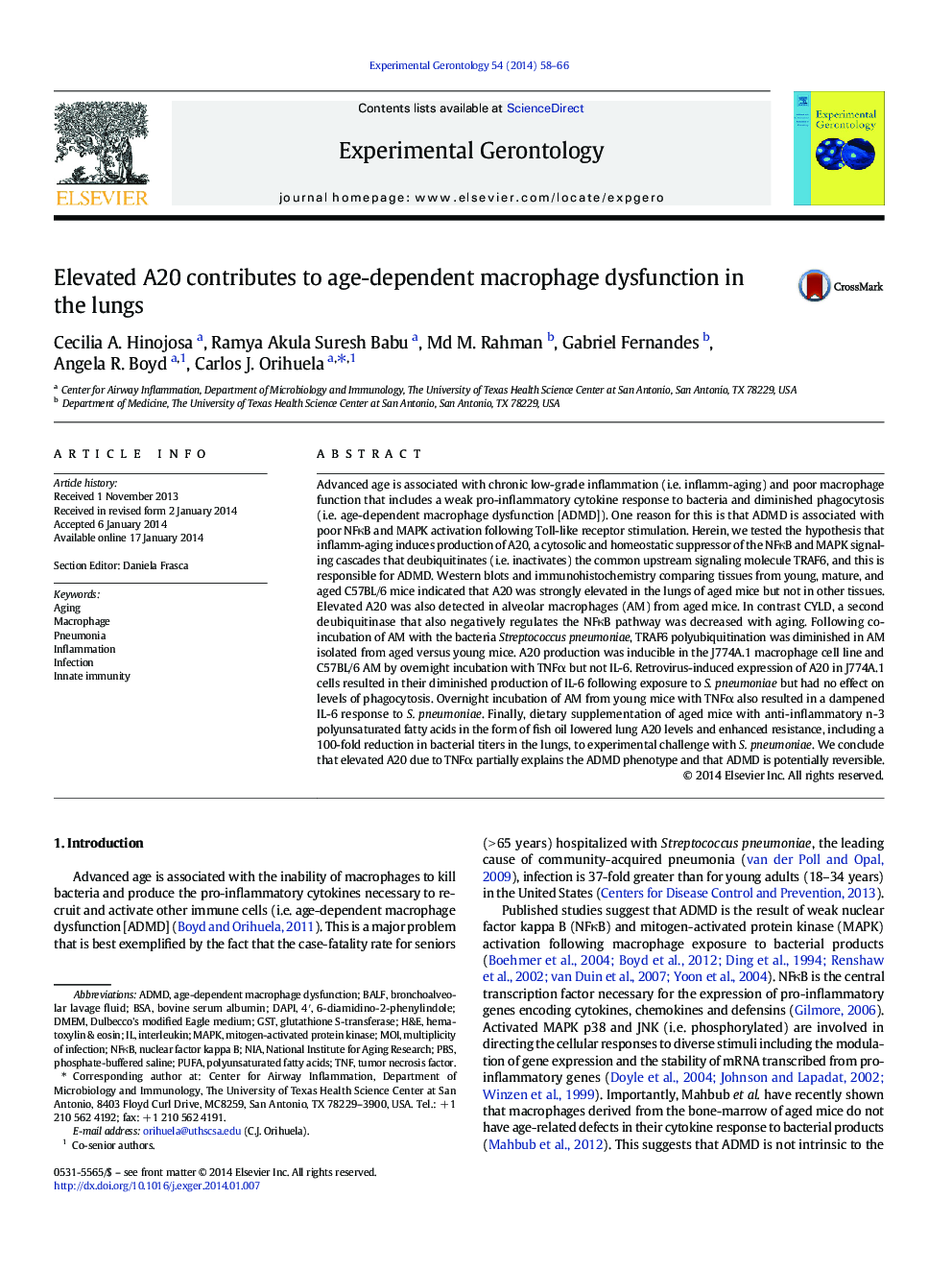| کد مقاله | کد نشریه | سال انتشار | مقاله انگلیسی | نسخه تمام متن |
|---|---|---|---|---|
| 8264448 | 1534887 | 2014 | 9 صفحه PDF | دانلود رایگان |
عنوان انگلیسی مقاله ISI
Elevated A20 contributes to age-dependent macrophage dysfunction in the lungs
دانلود مقاله + سفارش ترجمه
دانلود مقاله ISI انگلیسی
رایگان برای ایرانیان
کلمات کلیدی
TNFPBSADMDNIADMEMDAPIGST4′, 6-diamidino-2-phenylindole - 4 '، 6-دیامیدینو-2-فنیلینولBSA - BSADulbecco's modified Eagle Medium - Eagle Medium اصلاح شده DulbeccoH&E - H & EMAPK - MAPKMOI - MENFκB - NFKBbovine serum albumin - آلبومین سرم گاوPolyunsaturated fatty acids - اسید چرب اشباع نشدهPUFA - اسید چرب چند غیراشباعinflammation - التهاب( توروم) Innate immunity - ایمنی ذاتیinterleukin - اینترلوکینBALF - بافتPneumonia - ذات الریهAging - سالخوردگیInfection - عفونتtumor necrosis factor - فاکتور نکروز تومورnuclear factor kappa B - فاکتور هسته ای کاپا BMacrophage - ماکروفاژ Bronchoalveolar lavage fluid - مایع لارو برونکلوفلورPhosphate-buffered saline - محلول نمک فسفات با خاصیت بافریHematoxylin & Eosin - هماتوکسیلین و ائوزینmitogen-activated protein kinase - پروتئین کیناز فعال با mitogenmultiplicity of infection - چندین عفونتglutathione S-transferase - گلوتاتیون S-ترانسفراز
موضوعات مرتبط
علوم زیستی و بیوفناوری
بیوشیمی، ژنتیک و زیست شناسی مولکولی
سالمندی
پیش نمایش صفحه اول مقاله

چکیده انگلیسی
Advanced age is associated with chronic low-grade inflammation (i.e. inflamm-aging) and poor macrophage function that includes a weak pro-inflammatory cytokine response to bacteria and diminished phagocytosis (i.e. age-dependent macrophage dysfunction [ADMD]). One reason for this is that ADMD is associated with poor NFκB and MAPK activation following Toll-like receptor stimulation. Herein, we tested the hypothesis that inflamm-aging induces production of A20, a cytosolic and homeostatic suppressor of the NFκB and MAPK signaling cascades that deubiquitinates (i.e. inactivates) the common upstream signaling molecule TRAF6, and this is responsible for ADMD. Western blots and immunohistochemistry comparing tissues from young, mature, and aged C57BL/6 mice indicated that A20 was strongly elevated in the lungs of aged mice but not in other tissues. Elevated A20 was also detected in alveolar macrophages (AM) from aged mice. In contrast CYLD, a second deubiquitinase that also negatively regulates the NFκB pathway was decreased with aging. Following co-incubation of AM with the bacteria Streptococcus pneumoniae, TRAF6 polyubiquitination was diminished in AM isolated from aged versus young mice. A20 production was inducible in the J774A.1 macrophage cell line and C57BL/6 AM by overnight incubation with TNFα but not IL-6. Retrovirus-induced expression of A20 in J774A.1 cells resulted in their diminished production of IL-6 following exposure to S. pneumoniae but had no effect on levels of phagocytosis. Overnight incubation of AM from young mice with TNFα also resulted in a dampened IL-6 response to S. pneumoniae. Finally, dietary supplementation of aged mice with anti-inflammatory n-3 polyunsaturated fatty acids in the form of fish oil lowered lung A20 levels and enhanced resistance, including a 100-fold reduction in bacterial titers in the lungs, to experimental challenge with S. pneumoniae. We conclude that elevated A20 due to TNFα partially explains the ADMD phenotype and that ADMD is potentially reversible.
ناشر
Database: Elsevier - ScienceDirect (ساینس دایرکت)
Journal: Experimental Gerontology - Volume 54, June 2014, Pages 58-66
Journal: Experimental Gerontology - Volume 54, June 2014, Pages 58-66
نویسندگان
Cecilia A. Hinojosa, Ramya Akula Suresh Babu, Md M. Rahman, Gabriel Fernandes, Angela R. Boyd, Carlos J. Orihuela,